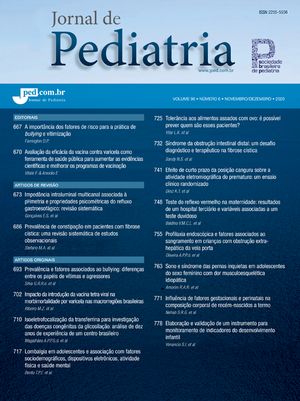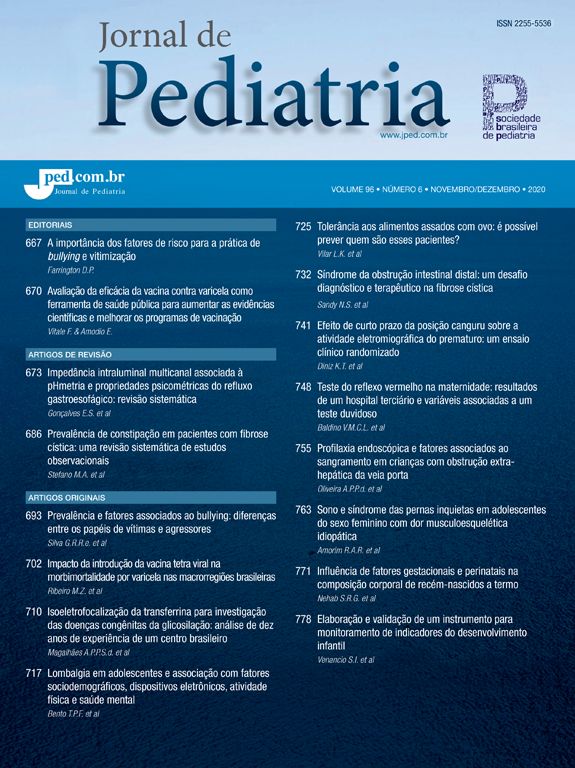
The increased survival of preterm infants poses the challenge of dealing with a wide range of chronic pulmonary diseases, including bronchopulmonary dysplasia, Wilson-Mikity syndrome and recurrent wheezing. This article reviews the pulmonary clinical and functional prognosis of preterm newborns in infancy and adolescence.
Sources of dataMEDLINE search for articles published between 1970 and 2004 that focused on lung growth and function of preterm infants, besides a clinical follow-up of this group.
Summary of the findingsPrenatal and postnatal events, such as placental insufficiency, tobacco exposure, infections, oxygen and mechanical ventilation, have an important effect on lung development and can lead to chronic lung diseases, of which bronchopulmonary dysplasia is the most severe complication. However, significant loss of lung function occurs in preterm infants who do not fulfill the criteria for bronchopulmonary dysplasia, and even in those who did not have significant respiratory disease during the neonatal period. The impact of prematurity on the respiratory system of these patients is usually underestimated. Clinically, preterm infants have an increased incidence of pneumonia and bronchiolitis, hospital readmissions due to respiratory diseases, chronic cough and wheezing and bronchial hyperresponsiveness. In adolescence, there is a tendency for normalization of the lung function, but they persist with reduced flows, lower exercise tolerance and bronchial hyperresponsiveness.
ConclusionsPrematurity, the events that cause it and the interventions that follow it permanently change the development of the respiratory system. Studies are necessary to clarify the effect of each of these perinatal insults on the development of the respiratory system.
O aumento da sobrevida de prematuros traz o desafio de lidar com um amplo espectro de doenças pulmonares crônicas, incluindo displasia broncopulmonar, síndrome de Wilson-Mikity e sibilância recorrente. Este artigo discute o prognóstico pulmonar clínico e funcional de prematuros na infância e na adolescência.
Fontes dos dadosFoi realizada pesquisa no MEDLINE de publicações entre 1970 e 2004 que abordassem função e crescimento pulmonar de prematuros, bem como a evolução clínica dos mesmos.
Sintese dos dadosEventos pré e pós-natais como insuficiência placentária, tabagismo, infecções, oxigênio e ventilação mecânica exercem efeitos importantes no desenvolvimento pulmonar, podendo conduzir a doenças pulmonares crônicas, sendo a displasia broncopulmonar a complicação clínica mais severa. No entanto, perdas significativas de função pulmonar também podem ocorrer em prematuros sem critérios de displasia broncopulmonar e que não apresentaram doença respiratória neonatal significativa. Nestes pacientes, o impacto da prematuridade sobre o sistema respiratório é freqüentemente subestimado. Clinicamente, observa-se incidência aumentada de pneumonias e bronquiolites, re-hospitalizações por doenças respiratórias, tosse e sibilância crônicas e hiper-reatividade brônquica. Posteriormente, percebe-se uma tendência à normalização da função pulmonar, mas persistem fluxos reduzidos, menor tolerância a exercícios e hiper-reatividade brônquica.
ConclusõesA prematuridade, os eventos que a provocam e as intervenções que dela decorrem alteram de maneira permanente, em maior ou menor grau, o desenvolvimento do sistema respiratório. São necessários estudos adicionais para esclarecer o efeito de cada um desses insultos perinatais no desenvolvimento do sistema respiratório.








